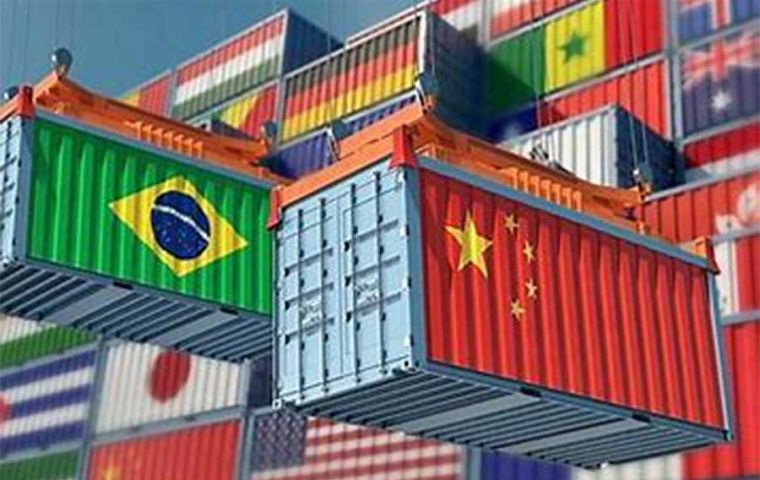MercoPress. South Atlantic News Agency
Brazil and China celebrate fifty years of diplomatic relations
 In the first half of 2024, Brazil exported US$ 28.44 billion in agricultural products to China, soybeans, corn, sugar, beef, chicken, cellulose, cotton, and fresh pork
In the first half of 2024, Brazil exported US$ 28.44 billion in agricultural products to China, soybeans, corn, sugar, beef, chicken, cellulose, cotton, and fresh pork China and Brazil celebrated on August 15, fifty years of diplomatic relations, which with time paved the way for Beijing to become Latin America's largest economy main trading partner.
According to the Brazilian Ministry of Foreign Affairs (MRE), the bilateral relationship is structured around the China-Brazil High-Level Coordination and Cooperation Commission (COSBAN), created in 2004 and elevated to a global strategic partnership in 2012. This year also marks the 20th anniversary of COSBAN’s creation.
The Secretariat of Trade and International Relations (SCRI) of the Ministry of Agriculture and Livestock (Mapa) reported that between August 2023 and July 2024, China was the top destination for Brazilian agribusiness exports, totaling US$ 58.6 billion—a 10% increase compared to the previous period. In 2023, Brazil set a new record by exporting over US$ 60 billion worth of goods to China, a jump of more than US$ 9 billion compared to 2022.
In the first half of 2024 alone, Brazil exported US$ 28.44 billion in agricultural products to China.Soybeans, corn, sugar, beef, chicken, cellulose, cotton, and fresh pork are the primary exports to China.
As part of this bilateral relationship, Brazil also imports goods from China, such as forest and textile products, totaling approximately US$11.8 billion.
A key factor contributing to the growth in exports was China’s authorization in March 2024 of 38 new Brazilian meatpacking plants—34 slaughterhouses and four distribution centers—the highest number of approvals ever granted. This enlarged the number of Brazilian companies authorized to export to China from 106 to 144.
Brazil’s Minister of Agriculture, Carlos Fávaro, has undertaken two ministerial missions to China, the most recent in June of this year, alongside Vice President Geraldo Alckmin. During the mission, the Brazilian government secured an agreement to promote Brazilian coffee in China’s largest coffee chain, with plans to purchase approximately 120,000 tons of coffee.
To maintain dialogue and strong trade relations, China is currently the only country with two Brazilian agricultural attaché posts in Beijing. Perosa also emphasized that restoring a fruitful dialogue with China enables significant progress, such as the expansion of key product exports, further strengthening Brazil’s role on the global stage.
Additionally we must remember that China and Brazil were planning to establish diplomatic relations back in 1964, under the administration of elected president Jango Goulart, but the military coup at the time prevented the relation to be established. Furthermore the Brazilian military of the time imprisoned several of the Maoist diplomats from the Beijing delegation.
Also despite the fluid commercial relation it must be remembered that Brazil belongs to the BRICS group, (Brazil, Russia, India, China, South Africa) and some new members among which Iran (Argentina's Milei dropped out of the invitation). In the BRICS, which has as one of its main purposes to end the dominance of the US dollar as the leading world currency in trade, commodities' quotes and reserves, China and India lead economically well ahead of Brazil.
Furthermore Brazil, as the leading nation of Mercosur is in no hurry to have the group sign a trade agreement with Beijing, fearing for its industrial base, (still weak and obsolete in many areas), and an invasion of Chinese goods to the 215 million Brazil market




Top Comments
Disclaimer & comment rules-

-

Read all commentsCorrection: the Brazilian population, according to the 2022 census, is 203 million people, not 215 million.
Aug 19th, 2024 - 09:48 am 0https://g1.globo.com/economia/censo/noticia/2023/06/28/censo-2022-brasil-tem-203-milhoes-de-habitantes-47-milhoes-a-menos-que-estimativa-do-ibge.ghtml
Its 2024 now Brasileiro, a good chance the population has grown a bit since 2022,
Aug 20th, 2024 - 12:35 pm 0Commenting for this story is now closed.
If you have a Facebook account, become a fan and comment on our Facebook Page!